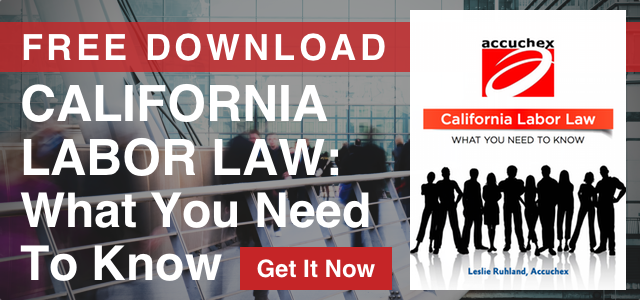In August 2015, Assembly Bill 1245 was passed, which created a new California labor law requiring employers to electronically submit tax returns, wage reports, and payroll tax deposits.

A New State Law Mandates Electronic Submission of Tax Returns, Wage Reports, and Payroll Tax Deposits for All Employers
According to the Employment Development Department (EDD) website, beginning on January 1, 2017, employers with 10 or more employees will be required to electronically submit employment tax returns, wage reports, and payroll tax deposits to the EDD.
All remaining employers will be subject to this requirement beginning January 1, 2018. Any employer required under existing law to electronically submit wage reports and/or electronic funds transfer to the EDD will remain subject to those requirements.
This mandate does contain a waiver provision for employers who are unable to electronically submit employment tax returns, wage reports, and payroll tax deposits. The EDD will accept waiver requests from employers beginning July 2016.
To request a waiver, employers must complete and submit the E-file and E-pay Mandate Waiver Request (DE 1245W).
Moving a Cumbersome Process Into the Present
The EDD has endeavored to put a technical assistance team in place to support employers in making the transition to its online system. The phased-in approach will enable EDD to undertake a robust education and outreach campaign.
“Employers can utilize EDD’s secure website and they do not have to purchase any additional software,” said Assemblyman Ken Cooley, the bill's sponsor. “AB 1245 also includes a hardship provision if an employer can’t access the online system.”
“Moving these filings online will save our state and businesses millions of dollars without requiring any additional infrastructure,” said Assemblyman Cooley. “As the home of the tech industry, California must continue to support innovative ways to make government function more efficiently.”
There Are Penalties for Not Complying with the E-file and E-pay Mandate
E-file and E-pay requirements are not optional after January 1, 2017 and penalties will incur for non-compliance of this mandate. The EDD has provided detailed information outlining the types of filing and forms with the associated penalties.

(Chart adopted from EDD website)
A Few Benefits and Details
The EDD has stressed that there are benefits for employers from the new requirements. In a recent letter issued to business owners, they listed them as follows:
- Increased data accuracy
- Data protection through encryption, which is safer and more secure than paper forms
- Reduced paper and mailing costs
- Lost mail eliminated
- Faster processing of returns and payments
The e-file and e-pay mandate requires the following returns, reports, and payments to be electronically submitted:
- DE 9 - Quarterly Contribution Return and Report of Wages
- DE 9C - Quarterly Contribution Return and Report of Wages (Continuation)
- DE 3BHW - Employer of Household Worker(s) Quarterly Report of Wages and Withholdings
- DE 3HW - Employer of Household Worker(s) Annual Payroll Tax Return
- DE 3D - Quarterly Contribution Return
- DE 88 - Payroll Tax Deposit
For additional information employers can go to the EDD's website and visit their FAQ page on the E-file and E-pay Mandate (Assembly Bill 1245).
Professional Help With Your Payroll Compliance Needs
An updated payroll compliance strategy will help your organization meet its obligations, while providing accuracy and timeliness. So take time to understand the laws, prioritize employee and manager salary changes, and maintain accurate record keeping. In this way, you will make compliance a sure thing.
If you are looking for reliable help with maintaining payroll compliance, we can help. If you are looking for additional help with your HR processes such as payroll management, you can also click on this link to get your Free Download: Payroll Outsourcing Guide to help you make an informed decision, or call Accuchex Payroll Management Services at 877-422-2824.


